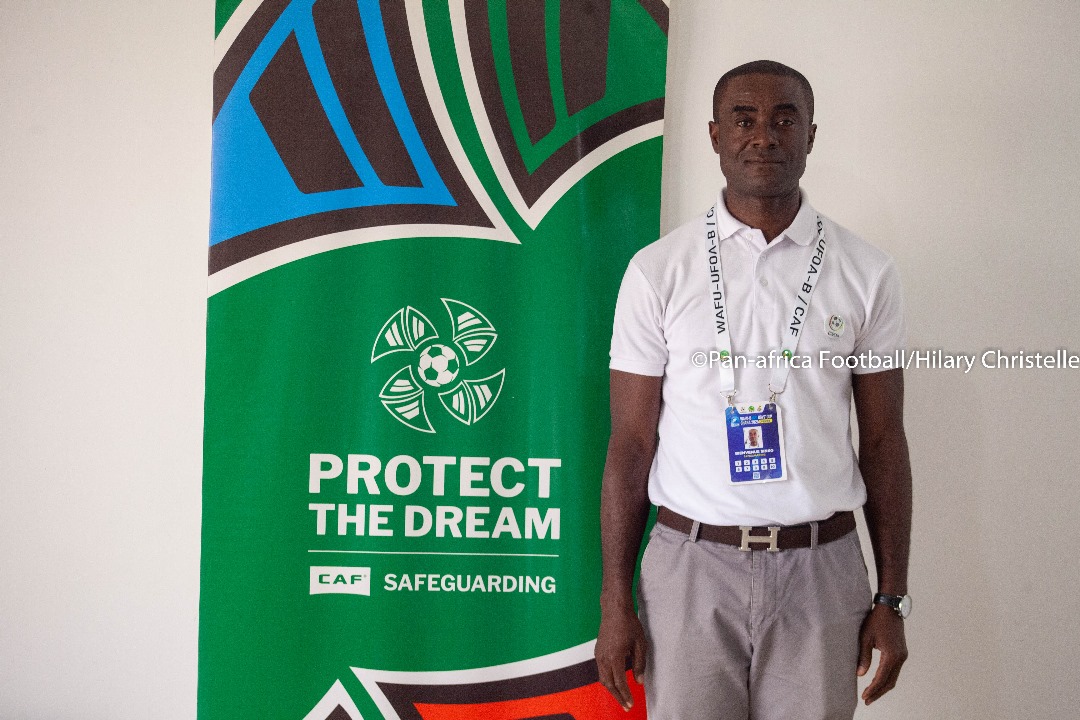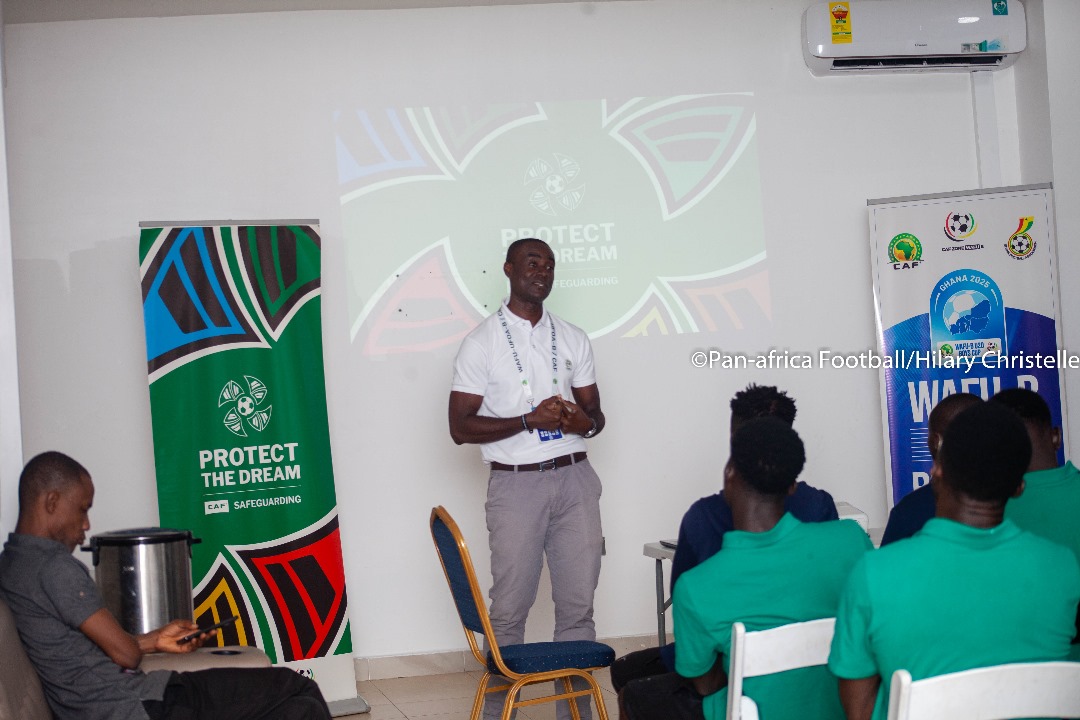Exclusive interview with Bienvenu Sinko, head of the Safeguarding program at WAFU-B

Bienvenu Sinko. Photo : Hilary Christelle Tolo Kpadonou
Exclusive interview with Bienvenu Sinko, head of the Safeguarding program at WAFU-B
At a time when abuse and exploitation threaten the integrity of football, FIFA is relying on safeguarding programs to provide young footballers with a safe environment to secure their dreams. It is within this framework that, for several months now, the safeguarding program has been deployed in the Confederation of African Football’s zonal competitions including West Africa’s WAFU-B zone.

The goal is to inform young footballers about the threats that can hinder their dream of becoming a professional footballer. The initiative is based on four pillars, from the fight against doping to the prevention of fake agents, as well as health and nutrition.
What are the objectives of the institutions responsible for the king of sports by implementing these projects? Bienvenu Sinko, Safeguarding Program Manager in the UFOAB zone, answered Hilary Christelle Tolo Kpadonou’s questions on the subject. Here is their full discussion.
What is the Safeguarding program and what does it actually consist of?
Safeguarding is an English word meaning “protection.” It is a program mandated and imposed by FIFA for the protection of children under 18 and vulnerable adults. In reality, it concerns all stakeholders working for the development of football around the world. The goal is to ensure a safe and healthy environment for all those who wish to play football.

What are the program’s specific objectives?
The goal is to prevent and protect children and vulnerable adults from abuse, whether physical, sexual, emotional, or related to neglect. Football is great, but beyond playing, we must provide young people with useful information to protect their dream of becoming a professional footballer.
This requires training and the creation of a safe environment. Because as a footballer, all we want is to be able to play. Just to play, and we often don’t take the necessary steps to clean up our environment, to be able to move from one stage to the next until we become professionals. FIFA and CAF institute the various types of training so that athletes can avoid the pitfalls that lie along their path.

How does the safeguarding program work?
Since 2022, CAF has introduced Safeguarding into its structures. Each federation is required to designate a male and a female focal point, responsible for developing the Safeguarding policy, and to establish internal committees or advisory boards to rule on cases of abuse or malpractice. The four types of abuse listed are: physical abuse, sexual abuse, emotional abuse, mistreatment, or neglect; these abuses are strictly prohibited in football.
We often see the inscription “Protect the Dream” on certain materials during WAFU B tournaments. What is it all about?
The initiative stems from an observation: every African footballer has a dream: to become a professional and succeed in their career. To achieve this, certain pitfalls must be avoided. CAF has therefore defined four pillars: Player trafficking – alerting players to fake agents and directing them to FIFA-approved agents; Health and nutrition – supporting players in a healthy lifestyle adapted to their age and level; Players’ rights – raising awareness of their rights and how to defend them; Media and social networks – learning to communicate effectively and manage their image. Each pillar is addressed with the participation of experts: a doctor for doping, a nutritionist for health, a communications professional for media, etc.
How do you approach doping?
Regarding doping, we’re not just talking about drugs, but also about prohibited substances. The list of prohibited substances is updated every year. A substance prohibited in 2025 could be authorized in 2026, and vice versa. Doping isn’t limited to positive tests: refusing a test, lying about one’s whereabouts, or working with someone suspended for doping is also punishable. The player is always responsible for what they take, whether they know it or not.
Examples:
- A very aggressive player or one with abnormal physical performance may be selected for testing.
- Refusing the test results in an automatic sanction.
- Testing can take place during or outside of competition, at any time. Players must therefore seek the advice of their club or national team doctor before taking any medication or supplement. In the event of an offense, both the player and the prescriber may be sanctioned.

Player trafficking and the role of agents: what do we need to know?
FIFA recommends signing contracts only with a sworn agent, and the world of player agents is regulated exclusively by FIFA. Check their badge with the QR code to avoid fake agents. If you scan the QR code with your phone, the person’s information will appear, proving whether they are a FIFA agent or not. Because if I sign a contract with a FIFA agent, if there’s a problem, I can contact FIFA. When it comes to intermediaries, scouts, or managers, the situation becomes more complex, and FIFA can’t intervene anyway. Players must read and understand their contract, seek advice when necessary, and always keep a copy of their contract. Verbal contracts are prohibited.
Safe recruitment and the protection of minors: what’s the situation?
Federations and clubs are responsible for safe recruitment. All coaches you hire, or who hire, must provide a criminal record. Individuals working closely with children or minors must not have any criminal record related to crimes involving minors. This is what we call safe recruitment. All coaches and individuals working in academies or youth teams must, in addition to the usual CV requirements, provide a criminal record.
Advice for young players
Beware of promises that are too good to be true. Football attracts many people with bad intentions.
EDITOR NOTE: This article is translated from the original written in French by Hilary Christelle Tolo Kpadonou for Pan-Africa Football.
